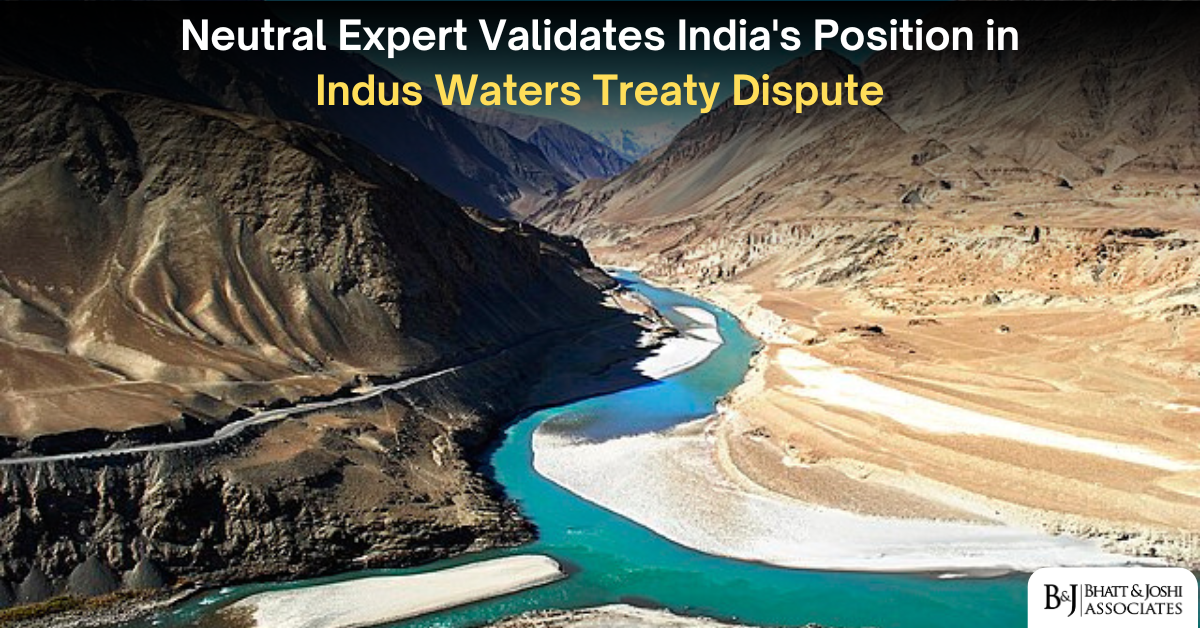Indus Waters Treaty Dispute: Neutral Expert Validates India’s Position
Introduction
In a landmark development, the Neutral Expert appointed by the World Bank has upheld India’s stance in the dispute over the Kishenganga and Ratle hydroelectric projects under the Indus Waters Treaty (IWT). This decision signifies a pivotal step in resolving a contentious water-sharing disagreement between India and Pakistan, reinforcing the Treaty’s provisions and dispute-resolution mechanisms.
The Indus Waters Treaty: A Historical Overview
The Indus Waters Treaty, signed in 1960 between India and Pakistan with the World Bank as a broker and signatory, is one of the most enduring international water-sharing agreements. The treaty divides the six rivers of the Indus Basin:
- Eastern Rivers (Ravi, Beas, Sutlej): Allocated to India
- Western Rivers (Indus, Jhelum, Chenab): Reserved for Pakistan, with India retaining limited usage rights for specified purposes, such as hydroelectric projects.
This Treaty provides robust mechanisms to address technical and legal issues, reflecting the need for collaboration between the two nations despite their historical rivalry.
Dispute Over the Kishenganga and Ratle Projects
At the heart of the current dispute are two hydroelectric projects India is constructing in Jammu and Kashmir:
- Kishenganga Project (330 MW): Located on the Kishenganga River, a tributary of the Jhelum.
- Ratle Project (850 MW): Situated on the Chenab River.
Pakistan alleges that the projects’ designs breach the IWT, potentially reducing water flow to its territory and compromising its rights under the treaty. India, on the other hand, maintains that the projects conform to the Treaty’s technical parameters.
Neutral Expert vs. Court of Arbitration: Key Distinctions
The Indus Waters Treaty establishes a three-tiered mechanism to address disputes:
- Permanent Indus Commission: For resolving issues through direct negotiations.
- Neutral Expert: For resolving technical “differences” about project design or treaty interpretation.
- Court of Arbitration (CoA): For handling broader legal “disputes” concerning the Treaty’s interpretation or application.
Neutral Expert
Focuses on resolving narrowly defined technical questions, such as permissible design features of infrastructure projects.
Appointed by the World Bank to maintain neutrality.
Operates within specific mandates, delivering precise technical rulings.
Current Expert: Michel Lino, an authority on large dams, affirmed his jurisdiction over seven technical questions concerning the Kishenganga and Ratle projects.
Court of Arbitration
Handles complex legal disputes that extend beyond technical aspects.
Operates under the aegis of the Permanent Court of Arbitration (PCA) in The Hague.
Requires agreement between both parties to convene and accept rulings.
The Current Dispute: Parallel Proceedings
The controversy deepened when Pakistan initially requested a Neutral Expert in 2015 to address technical concerns but later withdrew and sought a Court of Arbitration in 2016. India objected, arguing that the Treaty does not permit simultaneous proceedings under both mechanisms. Consequently, India recognized only the Neutral Expert’s jurisdiction and declined participation in the CoA.
The seven questions referred to the Neutral Expert included:
- Conformance of spillway design to treaty norms.
- Permissible drawdown levels for dead storage.
- Technical aspects of sediment control systems.
On January 20, 2025, Michel Lino ruled that all seven questions fell within his competence, endorsing India’s position.
Implications of the Neutral Expert’s Ruling on the Indus Waters Dispute
The decision is a diplomatic and legal triumph for India, reinforcing its interpretation of the IWT. It also sets a precedent for addressing similar disputes, ensuring the Treaty’s integrity in resolving differences.
India’s Position
India welcomed the ruling, with the Ministry of External Affairs emphasizing that it “upholds and vindicates India’s stand” on treaty implementation. The government reiterated its commitment to resolving technical issues within the treaty framework.
Pakistan’s Response
Pakistan continues to pursue the parallel arbitration process at the PCA, which India has rejected as “illegally constituted.” This divergence underscores the complexities of the treaty’s dual mechanisms and the challenge of reaching consensus.
Future of the Indus Waters Treaty
This ruling comes amidst broader discussions about revising the IWT. In 2023, India served notice to Pakistan for renegotiating the treaty under Article XII(3), citing evolving regional and environmental challenges. As both nations engage on this issue, the Neutral Expert’s decision reinforces the need for constructive dialogue within the treaty framework.
Conclusion: Strengthening the Indus Waters Treaty
The Neutral Expert’s ruling not only resolves a critical technical dispute but also highlights the efficacy of the Indus Waters Treaty in addressing contemporary challenges. It serves as a reminder that legal and technical mechanisms, when respected, can mitigate tensions and foster cooperation even between adversarial neighbors.
Moving forward, India and Pakistan must leverage this outcome as an opportunity to reaffirm their commitment to peaceful conflict resolution. Any modifications to the treaty should reflect the changing hydrological, environmental, and geopolitical realities of the Indus Basin, ensuring water security and regional stability for future generations.
 Whatsapp
Whatsapp


